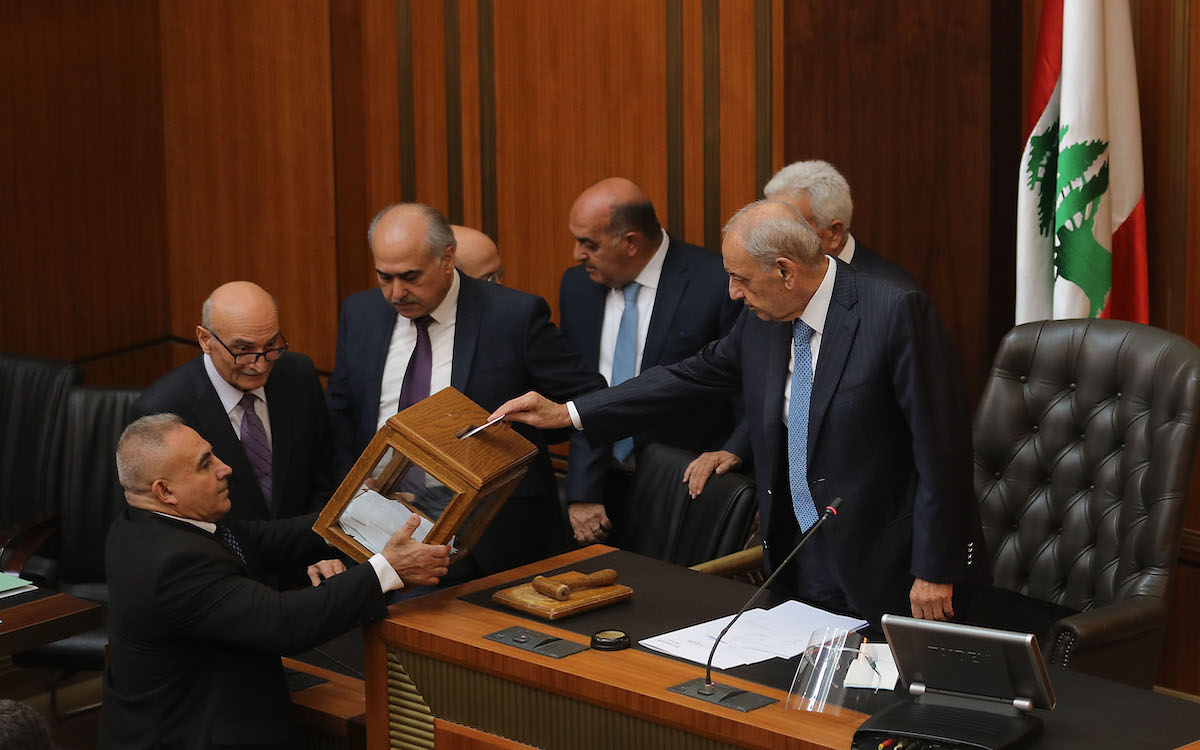The Lebanese parliament failed to elect a new Lebanese president for the fourth time on Monday, October 24.
As the current President Michel Aoun’s term ends in one week on the 31st of October, panic has begun to rise amongst the Lebanese public that parliament will once again put the country through another presidential vacuum.
Understanding the Lebanese democratic system
In the Lebanese electoral system, the president is elected by the parliament and not directly by the citizens. Under article 49 of the Lebanese constitution, voting occurs over two rounds, where the candidate must secure an absolute majority of at least 86 votes.
In the first round, any candidate must reach a qualified majority of two-thirds of the members of the Lebanese Parliament to be elected from the first round. If candidates fail to reach this threshold, then elections occur over multiple rounds where only an absolute majority is sufficient to elect the president.
Results and Disputes
The first electoral session was held on September 29, 2022. The round failed to result in any candidate’s election, as both candidates Michel Moawad (son of former president Renee Moawad) and Salim Edde failed to secure 86 votes, with each garnering only 36 and 11 votes respectively.
Some parliamentarians failed to cast legible votes, with 10 MPs choosing to vote for Lebanon, while one vote was casted in favour of Mahsa Amini, a woman believed to have been murdered by the Iranian state.
Before the second round could even begin, many MPs unexpectedly left the chamber, further delaying the electoral process as the assembly was unable to secure a quorum.
Following the postponement, a second session was held on October 13, but also failed to reach quorum as only 71 out of 128 MPs attended. A third session was also held, where candidates Michel Moawad and Milad Abou Malhab also failed to reach the absolute majority of votes with 42 and 1 vote each. 55 casted blank ballots, with 21 casting invalid ballots.
The results for the fourth session included 50 blank votes by Hezbollah lawmakers and allies, 39 votes for Michel Moawad and 10 votes for Issam Khalife, a professor at the Lebanese University who is allegedly independent. Some lawmakers walked out before another round could be held.
Elias Hankash, a lawmaker from the Kataeb Party that supports Moawad, told France 24 that “No bloc in parliament can impose a president, not Hezbollah nor anyone else.”
“It is about time we left absurdity behind because after the session (tentatively) scheduled for Thursday, we will be facing a deadlock,” said MP Hadi Abu Al-Hosn, part of the democratic Gathering bloc.
Michel Moawad is regarded as anti-Hezbollah. He is the nominee of the opposition groups, including Kataeb, the Lebanese Forces, the Progressive Socialist Party, and independent members of parliament.
Talks between MPs and parties to choose a president by consensus were suggested by Hezbollah and the Amal Movement. On the other hand, several opposition MPs saw this proposal as anti-democratic and an attempt to transform the parliament into a replica of Afghanistan’s “loya jirga,” a group of leaders that settles disputes by consensus.
“Whoever cast blank ballots is calling for dialogue and consensus, and whoever bets that they would win the presidency must know that the election of the president is achieved by securing consensus among all,” said Alain Aoun, a member of the Free Patriotic Movement (FPM)
Samir Geagea, leader of the Lebanese Forces and an ally of Saudi Arabia, criticized lawmakers who put a blank vote and accused them of disrupting elections.
Another 2-Year Presidential Vacuum?
This indeed is not the first time the parliamentarians have failed to elect a president. Lebanon went through a 2-year presidential vacuum from 2014 to 2016.
After 45 rounds of failure, political instability and calls demanding to elect a president, Michel Aoun was elected as the 13th president of Lebanon in the 46th round.
In the current environment of electoral chaos, fear surrounds another presidential vacuum. Unlike in 2016, the present government is a caretaker one as MP Najib Mikati failed to form an active one.
Although Mikati has previously given assurances that the new government is set to be formed before President Aoun’s term ends, which doesn’t seem possible in only one week, the lineup of ministries Mikati presented to Aoun did not persuade him to give the green light for establishing the new cabinet.
Speaker of Parliament, Nabih Berri called for a fifth electoral session to take place on Thursday, hoping to end the long-lasting disputes and attempt to elect a president.
The country has been going through a series of crises that crippled the economy and the overall quality of life for Lebanese citizens. Following the 2019 protests, the Lebanese currency has lost 80 percent of its value, in addition to the global inflation of prices and the downfall of the Lebanese banking system.
The Covid-19 pandemic also played a big role in the downfall of the economy, as many businesses were shut down and many people lost their jobs. As a result, many Lebanese citizens and residents of Lebanon emigrated hoping to find a better life abroad.


